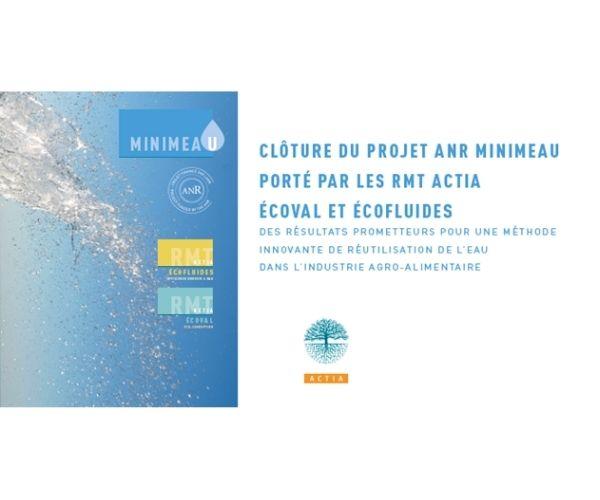Industrial and environmental transition
Closing of the " ANR Minimeau " project
15
Dec

Published on : 15/12/2021
AgroParisTech, INRAE, ProSim and 5 ACTIA centers (French Network of Agro-Food Technical Institutes) have just closed the ANR Minimeau project with a final conference held this Tuesday, December 7, 2021 in Paris - an opportunity to review the results of this study which shows a potential savings of up to 30%.
A study that responds to environmental and economic issues for agri-food companies.
Water, a vital resource for agri-food companies, is under increasing pressure from climate change. The resilience of companies requires a drastic reduction in their water consumption, and in some cases the elimination of external water supplies.
The Minimeau project (co-financed by the French National Research Agency) has made it possible to develop and test systemic tools that aim to reduce water consumption and effluent discharges by optimizing water reuse on an industrial site. Analyses carried out on sites show potential savings of up to 30%. During the 4 years of the project, two theses associated with measurements carried out by the technical centers in 10 partner companies made it possible to develop and test the water pinch method, water network optimization tools. Advanced analyses were carried out on 2 sites with a detailed characterization of the water flows and the realization of laboratory tests of treatment of samples taken on site. Finally, educational and technical work on the water footprint has enabled the construction of simplified calculation software dedicated to the reuse of water.
Promising results unveiled at the final conference
The final conference of the project, which took place on December 7, 2021 at the CNAM in Paris, brought together about fifty participants: agri-food companies, technical centers, consulting firms and institutions. They were made aware of the concept of Thermal Pinching, from which the Water Pinching method is inspired. The method and the tools of water pinching developed within the framework of the project were presented with illustrative examples. The results of the effluent treatment tests by membrane techniques allowed to identify the most suitable membranes and operating conditions to purify the water for its reuse.
Finally, a tool for calculating environmental gains via a water footprint or a LCA (Life Cycle Assessment) allows the comparison of the different solutions considered.
All of the tools presented at this conference will be posted on the project website https://minimeau.fr/ by the end of 2021.
Obstacles remain to be removed
Regulations related to water quality are still the main obstacle to reuse. There are strong expectations from the sector that experiments could be carried out with industrialists. They would allow to confirm the reduction potential identified during this project: advice to public decision makers!
About: The Minimeau project was carried out by 8 partners: AgroParisTech (scientific coordination), INRAE, ProSim (software publisher) and 5 centers ACTIA ACTALIA, CTCPA, IFV, ITERG and CRITT Agroalimentaire PACA (technical coordinators).
Press contact : Yvan DELOCHE - Yvan.deloche@critt-iaa-paca.com
__
To learn more about the CTCPA's water consumption management expertise, click here.






